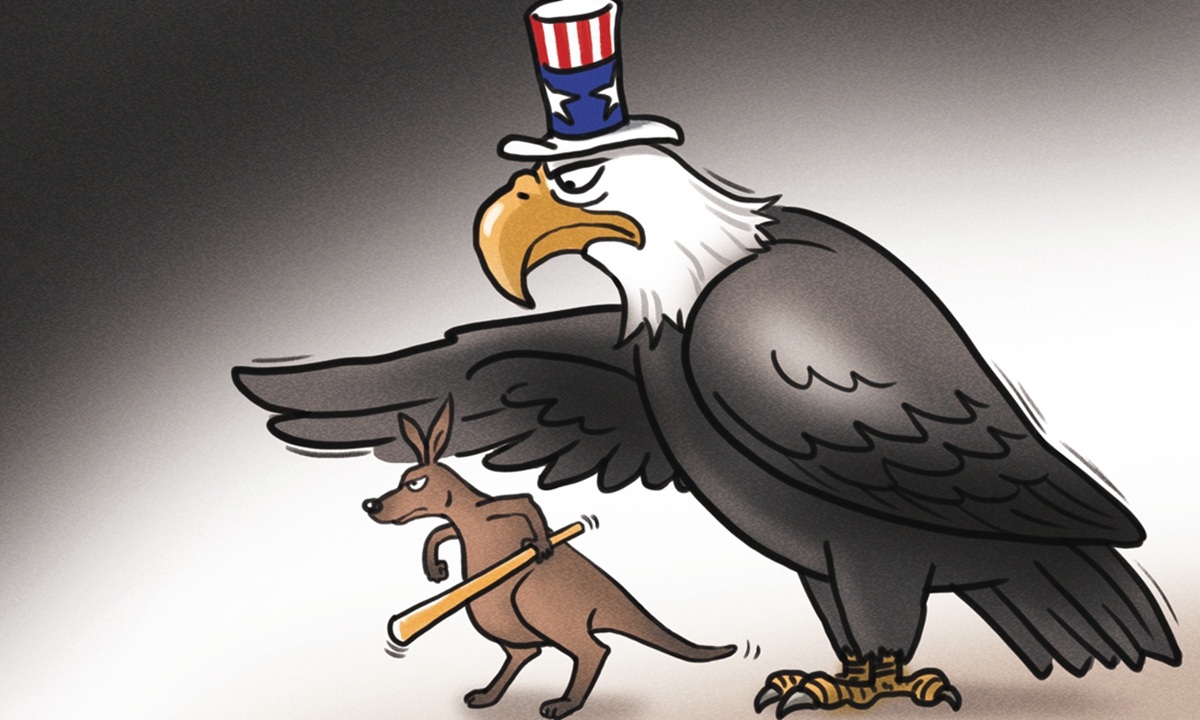
Illustration: Liu Rui/GT
The US, the UK and Australia recently announced the establishment of a security partnership called AUKUS. But the military cooperation between the US and Australia did not stop there. Under their Cold War mentality, the two countries further discussed their missile business. Canberra intends to allow Washington to deploy strategic bombers, in exchange for Washington to help it develop long-range precision-strike weapons. As the first step, Australia will purchase the US' Tomahawk cruise missiles.
Tomahawk cruise missiles are strategic offensive weapons developed by the US. In the Gulf War in 1990-91, the US used Tomahawk for the first time, with more than 200 bombarding targets in Iraq, resulting in humanitarian disaster. In the following wars in Yugoslavia, Kosovo, Libya and Syria, Tomahawk became the chief tool for subverting other countries. Tomahawk has greatly contributed to US' use of military overseas, becoming synonymous with the new interventionism of the US and West.
Tomahawk is a big stick to invade in and intimidate other countries, and the US is not willing to sell it to other countries except the UK, a hard-core US ally. But this time, to militarily contain China, the US did not hesitate to use Tomahawk to show favor to Australia. In recent years, Australia has repeatedly played its anti-China card to seek recognition from the US. However, Australia is tying the bomb to its own belt by doing this. Canberra itself will suffer in the end.
As for missile nonproliferation, the international community has not reached a universally applicable international law yet. Under this circumstance, all countries should have adopted a restrained, cautious and responsible attitude in the transfer of missiles. They should take concrete actions to maintain international peace and stability. But the US-Australia deal of Tomahawk runs counter to this. Australia is located in the South Pacific and has a superior geographic environment. It has not received any major security threats. But the introduction of Tomahawk far exceeds its defense needs and is bound to arouse vigilance and opposition of neighboring countries.
This move has also let the international community see the hypocrisy of US' "nonproliferation rules." The Missile Technology Control Regime (MTCR) is a small circle of export controls established under the US lead. The MTCR stipulates that missile systems with a range of more than 300 kilometers and payload of 500 kilograms should be subject to transfer restrictions. The US and Australia have imposed numerous restrictions on countries outside their small clique, but they have unscrupulously transferred advanced missiles within their circle. This is undoubtedly double standards.
We need to be vigilant that Tomahawk may actually be an extremely dangerous nuclear cruise missile. In recent years, the US military has been seeking to develop space-based and low-yield, submarine-launched nuclear weapons.
The Tomahawk missile deal may be the tip of the iceberg. Australia announced in March that it will move to produce its own guided missiles under a A$1-billion plan to establish a new weapons facility with a global arms manufacturer. In recent years, the US and Australia have been strengthening military cooperation in areas such as anti-missile, outer space and cyberspace. The two countries have also jointly developed hypersonic missiles. These acts will inevitably open the Pandora's Box of regional arms race.
The US has always regarded itself as a guard of world peace, frequently interfering in other countries with force. The US has formed a huge arms sales chain and has gained huge profits from it. Over the past five years, the total amount of US arms exports has ranked first in the world, accounting for 37 percent of the world's total sales. The Asia-Pacific is the region with the most arms imports, and Australia and other US allies are among the top 10 arms importers internationally. It is conceivable that under the stimulation of US-Australia arms sales, Asia-Pacific countries will further increase their arms imports, and this is exactly what the US military companies and arms dealers want.
The US has stated that it does not seek a new cold war. Yet it has always been provoking one. This is why the country has been recognized as the biggest destroyer of global stability. The US and Australia have gone against the historical tide of peace and development. For this, they will be generally despised by the international community. The two countries should not go too far on the nuclear and missile issue. Australia also needs to think twice. It needs to understand that it has received nothing but a hot potato, and that how many countries in history have eventually been abandoned by the US.
The author is an observer on international affairs. opinion@globaltimes.com.cn
